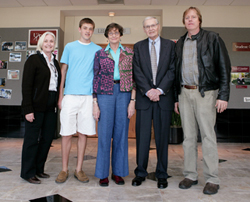UALR Honors ‘Best, Brightest’ Ledbetter at DSC
It was 1960, the dawn of the New Frontier, and Calvin R. Ledbetter Jr. had the right stuff.
He was a graduate from the world-acclaimed Woodrow Wilson School of Public and International Affairs at Princeton University. He had served overseas as a lawyer for the U.S. Army Judge Advocate Corps and he had just earned a Ph.D. in political science from Northwestern University in Chicago.
 He was one of the best and brightest. His options were limitless. Without much hesitation, he chose Arkansas and UALR.
He was one of the best and brightest. His options were limitless. Without much hesitation, he chose Arkansas and UALR.
“I always wanted to spend my life in Arkansas,” Ledbetter said in a recent interview. “UALR has made all of that possible and I am truly grateful.”
Now, UALR is honoring the tall, lanky professor emeritus who helped create the University – literally – and who has donated more than $1 million in scholarships and gifts. Even more valuable, for 48 years he has touched thousands of students by teaching them the science of politics and government as well as its history.
UALR officials unveiled March 30 a new brushed metal sign identifying the Donaghey Student Center’s three-sectioned ballroom the Calvin R. Ledbetter Jr. Assembly Hall.
The sign salutes the professor, the chair, and the dean who experienced the world and saw that home was best. Even a call from Ethel Kennedy asking him to become the director of the John F. Kennedy Presidential Library in Boston couldn’t tempt him.
“I thought about it,” he said about the 1987 call from the widow of Robert Kennedy, brother of the slain president. Robert Kennedy was assassinated in 1968 during his run for the White House.
“I liked the small-town quality of Arkansas. Of course I had family here; I was raised here. I was born at St. Vincent Infirmary – you don’t get any more Little Rock than that,” Ledbetter said. “But I always wanted to be in Arkansas. I received a great education in the public schools here, particularly Little Rock Central High. I wanted to pay that back.”
Arkansas’ small town quality was a selling point when he scoured academia to recruit talent for the UALR’s faculty.
“I had this guy, good candidate from one of the California state schools and he had a choice between that school and UALR. He picked UALR,” Ledbetter said. “I asked him why and he said, ‘If I came to Arkansas, in six months I could know the governor and attorney general and interview them both. If I was in California, it might take years and I might never know them or interview them.’
“I thought that was a great comment in terms of the attractiveness of Arkansas.”
But another professor said it was the recruiter himself who made an appointment to UALR’s faculty so intriguing.
“Dr. Ledbetter was one of the main reasons I came to UALR. He hired me as an assistant professor of political science,” said Chancellor Joel E. Anderson, who was a teaching fellow and underclassmen advisor at the University of Michigan before joining UALR’s Department of Political Science as an assistant professor in 1971.
“He is an outstanding figure in the development of this University. With high visibility as a progressive legislator, he added prestige to the university,” the chancellor said. “He has been a great colleague – witty, insightful, and enjoyable.”
Dr. Charles Chastain, professor of criminal justice, said his long-time tennis partner’s love of Arkansas politics, its history, and culture were evident daily.
“For a time a long time after the Donaghey Student Center opened, Cal would go around correcting people when they would refer to it as the ‘student union,'” Chastain said. “‘That’s the Donaghey student union’ he would say, always making sure they would give the governor his due.” Ledbetter’s book, “Carpenter from Conway” detailed the former governor’s critical role in the development of education in Arkansas.
Ledbetter did more than teach political science – he practiced it. He ran for the state House of Representatives in 1966 and was swept into office along with Gov. Winthrop Rockefeller and a handful of other Pulaski County progressives.
“He came in with five or six of them – Herb Rule, Charles Matthews, Cal – there were a bunch of them that year,” said long-time columnist and Capitol correspondent Ernie Dumas. “He served five terms and then in 1976 when (former Congressman) Wilbur (Mills) didn’t run again after the Tidal Basin incident and Fanne Fox and all that stuff, there was a wide open race. Cal got in it and finished a strong third.” Former congressman and later governor Jim Guy Tucker ultimately won the seat.
Dumas said Ledbetter’s biggest legislative accomplishment was his successful sponsorship of Arkansas’s first “circuit breaker” law that provided property tax relief for the elderly.
“He authored or co-sponsored all those educational reforms during the Rockefeller and Bumpers years – free kindergarten, special education, free text books – there were a lot of them,” Dumas said. Ledbetter also wrote the bill that reorganized the Arkansas General Assembly’s inner workings, efficiencies still in effect. And he was vice president of the 1980 Arkansas Constitutional Convention.
But to his UALR family, Ledbetter’s most significant legislative accomplishment was his behind-the-scenes work securing the necessary support to transform privately operated Little Rock University into UALR, a member of the University of Arkansas System. Because he worked at LRU, Ledbetter didn’t author or co-sponsor the bill creating the new entity. But he worked the halls and the quiet room behind the chamber, explaining Arkansas’ need for a public university in the capitol city.
“Nobody disliked Cal and nobody felt challenged by him. He was a pretty effective legislator for an old liberal egghead,” Dumas said. “Darn effective.”